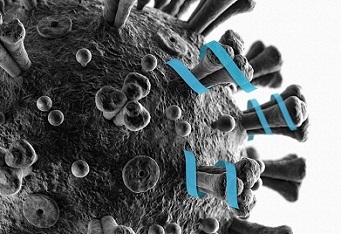Endogenous piRNAs – The Next Armaments For The Battle With SARS-CoV-2 Omicron Variants And Even Cancer!
COVID-19 News - Endogenous piRNAs Apr 05, 2023 2 years, 10 months, 2 weeks, 5 days, 21 hours, 16 minutes ago
COVID-19 News: In an astounding revelation, a groundbreaking study by researchers from the Polish Academy of Sciences and A. Baitursynov Kostanay Regional University in Kazakhstan has identified a potential game-changer in the battle against the relentless SARS-CoV-2 Omicron variant.

Although the research is still in its preliminary, in silico phase, the astonishing findings are impossible to ignore. These remarkable molecules, known as piRNAs (PIWI-interacting RNAs), are not only making waves in the fight against COVID-19 but are also revolutionizing the field of oncology!
These ingenious piRNAs, ie small non-coding RNA molecules measuring approximately 24–31 nucleotides in length, are renowned for binding to PIWI proteins, thus playing a pivotal role in regulating critical biological processes.
Previously believed to be exclusive to the mammalian germline, recent discoveries have shown that piRNAs are expressed in various human tissues in a tissue-specific manner, modulating vital signaling pathways at both transcriptional and post-transcriptional levels.
But that's not all! An increasing number of studies have unveiled the extraordinary potential of piRNAs and PIWI proteins as novel biomarkers and therapeutic targets in the realm of cancer diagnostics and treatment. These molecules, found to be abnormally expressed in various cancers, could very well unlock the door to a new era of cancer-fighting breakthroughs.
When piRNAs bind to PIWI proteins, they form a formidable piRNA/Piwi complex that influences a range of essential biological functions, including transposon silencing, spermiogenesis, genome rearrangement, epigenetic regulation, protein regulation, and germ stem-cell maintenance.
The Omicron variant, being the most mutated strain of SARS-CoV-2, has caused significant concern due to its high transmissibility and ability to evade immunity.
As the Omicron variant continues to evolve and spread as reported in many
COVID-19 News coverages, the need for effective treatments becomes more urgent. This study represents a significant leap forward in our understanding of the virus and the potential role of piRNAs in combatting its devastating effects. With the power of endogenous piRNAs now brought to light, the race is on to harness their potential in the ongoing fight against COVID
The study team aimed to examine the interaction between PIWI-interacting RNAs (piRNAs) and the SARS-CoV-2 genome in order to identify endogenous piRNAs and propose synthetic piRNAs for drug development.
The study team utilized validated bioinformatic approaches to study the interaction of over eight million piRNAs with the SARS-CoV-2 genome. Several piRNA binding sites were identified within the genome, and sixteen synthetic piRNAs were proposed for drug development. These piRNAs have the potential to suppress the reproduction of SARS-CoV-2.
The Omicron variant continues to infect populations worldwide, and understanding its properties is crucial for the development of effective treatments. The SARS-CoV-2 genome shares similarities with mRNA structures of protein-coding genes, which may allow piRNAs to regulate the synthesis of proteins
and participate in suppressing the virus's reproduction in the human body.
The in-silico analysis of piRNA interactions with the Omicron strain's genome allowed researchers to identify endogenous piRNAs capable of suppressing viral replication. Based on these piRNAs, the study team proposed synthetic piRNAs for drug development.
The study found 92 piRNAs that could bind to the SARS-CoV-2 genome with a value of -130 kJ/mol or more. These piRNAs bound fully complementarily through the interaction of canonical and non-canonical base pairs.
The study team identified clusters of piRNA binding sites in the genome, which may be more effective in suppressing both protein synthesis and viral replication.
The study team speculate that the human body produces numerous piRNAs that can suppress the coronavirus, providing a reliable defense against the pathogen. The ability of piRNAs to interact with the Omicron variant's genome suggests that these molecules could play a crucial role in the development of novel therapeutics against the virus.
Furthermore, the study highlights that single nucleotide mutations in piRNA binding site clusters may not significantly protect the coronavirus from piRNAs. However, substitutions of three or four nucleotides in these clusters could reduce the impact of piRNAs on viral replication.
Based on the endogenous piRNAs that have been identified, the study team proposed 16 synthetic piRNAs with strong antiviral activity. These piRNAs have free binding energy ranging from −170 kJ/mol to −175 kJ/mol. They can be used to create drugs that suppress the reproduction of the SARS-CoV-2 Omicron variant. Further experimental studies are needed to confirm the effectiveness of these piRNAs as potential therapeutic agents.
In conclusion, this sensational study has shed light on the in-silico interaction between endogenous piRNAs and the SARS-CoV-2 Omicron variant genome. It has not only revealed potential targets within the viral genome but also proposed synthetic piRNAs with strong antiviral activity for drug development. With further experimental validation, these findings could lead to a groundbreaking leap in our battle against COVID-19, potentially saving countless lives worldwide.
The study findings were published in the peer reviewed journal: Current Issues In Molecular Biology.
https://www.mdpi.com/1467-3045/45/4/193
For the latest
COVID-19 News, keep on logging to Thailand Medical News.
